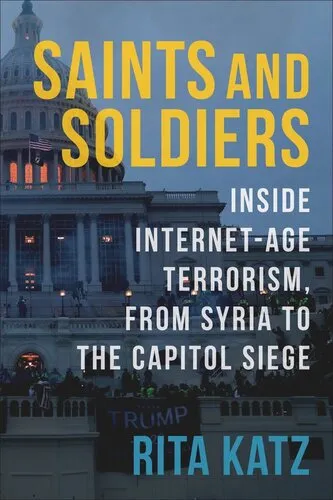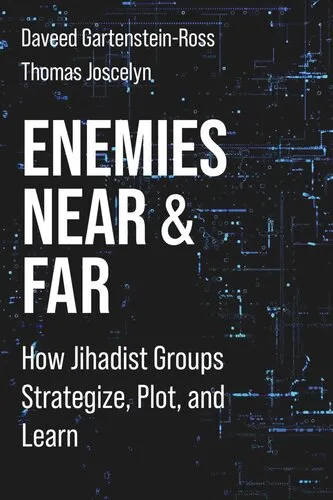Saints and Soldiers: Inside Internet-Age Terrorism, From Syria to the Capitol Siege
4.5
Reviews from our users

You Can Ask your questions from this book's AI after Login
Each download or ask from book AI costs 2 points. To earn more free points, please visit the Points Guide Page and complete some valuable actions.Related Refrences:
Introduction to Saints and Soldiers: Inside Internet-Age Terrorism, From Syria to the Capitol Siege
In a world increasingly shaped by online platforms and digital interconnectedness, terrorism has evolved into an unrecognizable but dangerously pervasive new force—the weaponization of the internet. Saints and Soldiers dives deep into the realms of internet-age terrorism, exploring how radicalization, recruitment, mobilization, and misinformation have merged to create a landscape of conflict that is as virtual as it is physical.
In this book, I, Rita Katz, utilize over two decades of research and investigative experience to shine a light on the disturbing interplay between online extremism and real-world violence. From the battlegrounds of Syria to the chaotic events of the Capitol Building siege in Washington D.C., this book acts as a critical exposé of how terrorist movements exploit modern technology to achieve their most sinister goals. Terrorism today is no longer limited to covert planning or behind-the-scenes coordination; it is broadcasted live, reshaped by algorithms, and legitimized by echo chambers that leave societies fractured and vulnerable.
Saints and Soldiers is not simply an academic deep-dive but a call to arms for the modern era. It is a cautionary tale of the dangers of unregulated digital realms, as well as a sobering reminder of the power of disinformation, the seductive pull of ideologies, and the humanity that is often overlooked amidst the noise. This book is for anyone seeking to understand how extremism thrives, shifts, and adapts in the 21st century—and what must be done to counter it.
Detailed Summary of the Book
Saints and Soldiers is structured around pivotal events and case studies that demonstrate how terrorism has adapted to the digital sphere. It begins with an exploration of the Syrian Civil War, where extremist groups weaponized social media platforms like never before. From recruiting fighters to raising funds and disseminating propaganda, groups like ISIS flourished due to their mastery of online communication, especially as they appealed to both local and global audiences. The book later transitions into discussing Western societies, where extremism no longer comes from external threats alone, but internal divisions exploited online. It provides gripping insights into how far-right extremist groups in the United States, for example, used online platforms to recruit members, propagate conspiracies, and organize events like the Capitol siege on January 6, 2021. By intertwining stories from those impacted—both the perpetrators and victims of these events—the book provides an emotionally resonant yet analytically rigorous narrative. It is a global journey through the new face of radicalization, examining coordinated online disinformation campaigns, lone actor attacks inspired by internet propaganda, and the devastating convergence of digital manipulation with real-world consequences.
Key Takeaways
- Modern terrorism operates just as much in the realm of ones and zeroes as it does in physical spaces.
- Social media has become a breeding ground for extremist ideologies, amplifying voices that feed on division, anger, and fear.
- Both far-right and jihadist extremism share striking similarities in their online strategies, especially in recruiting and creating narratives of belonging.
- Disinformation is a powerful tool that undermines democracy, trust, and unity, making societies ripe for manipulation.
- Countering digital-age terrorism requires a multi-pronged approach, involving governments, tech companies, and civil society working together.
Famous Quotes from the Book
"In the digital age, extremism doesn’t ask for your allegiance loudly; it whispers lies quietly into your phone screen until you believe them to be truths."
"The keyboard has replaced the Kalashnikov as the most powerful tool in the terrorist’s arsenal."
"Radicalization in the 21st century is as simple as a retweet, but its consequences can shake nations to their core."
Why This Book Matters
Saints and Soldiers is a book for our time. It matters because it addresses the hidden battlefield most people are unaware of: the internet. Terrorism today does not look like it did ten, twenty, or fifty years ago. It is no longer confined to the realms of clandestine meetings, black-market weaponries, or far-off battlefields. It has infiltrated daily life, targeting individuals in their homes through algorithms that prey on their fears and doubts. Understanding the tactics and strategies of modern extremist movements is essential for policymakers, academics, tech leaders, and everyday citizens alike. This book matters because it connects the dots between the digital and the physical, the local and the global, the individual and the collective. It underscores the urgency of addressing the unregulated online spaces where hatred festers and actions are planned. Most importantly, it aims to empower readers with the knowledge to recognize and resist the pull of extremism—be it from a far-off jihadist fighter or their next-door neighbor consumed by conspiracy theories. As the world continues to grapple with the challenges of an interconnected society, Saints and Soldiers offers not just an analysis of where we are but a vision of what must be done to preserve peace and stability in the face of evolving threats.
Free Direct Download
You Can Download this book after Login
Accessing books through legal platforms and public libraries not only supports the rights of authors and publishers but also contributes to the sustainability of reading culture. Before downloading, please take a moment to consider these options.
Find this book on other platforms:
WorldCat helps you find books in libraries worldwide.
See ratings, reviews, and discussions on Goodreads.
Find and buy rare or used books on AbeBooks.
1237
بازدید4.5
امتیاز50
نظر98%
رضایتReviews:
4.5
Based on 0 users review
"کیفیت چاپ عالی بود، خیلی راضیام"



